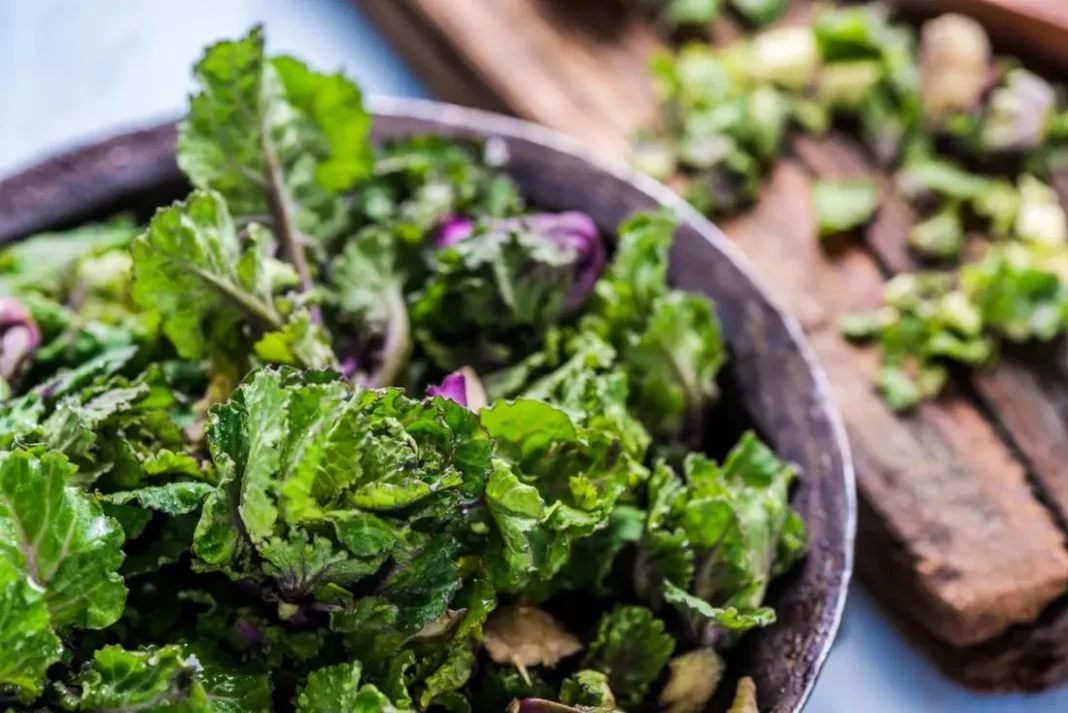Kale is a green, leafy, cruciferous vegetable that is rich in nutrients. Kale can be good for adding fiber and antioxidants to the diet in many savory dishes, salads, and smoothies.
It is a member of the mustard, or Brassicaceae, family, as are cabbage and Brussels sprouts.
Possible benefits include helping manage blood pressure, boosting digestive health, and protecting against cancer and type 2 diabetes.
This article looks at the nutritional content and health benefits of kale, how to include it in the diet, and reasons why some people should not eat too much of it.
Benefits
Kale contains fiber, antioxidants, calcium, vitamins C and K, iron, and a wide range of other nutrients that can help prevent various health problems.
Antioxidants help the body remove unwanted toxins that result from natural processes and environmental pressures.
These toxins, known as free radicalsTrusted Source, are unstable molecules. If too many build up in the body, they can lead to cell damage. This may result in health problems such as inflammation and diseases. Experts believe that free radicals may play a role in the development of cancer, for example.
Learn more here about antioxidant foods.
Diabetes
The American Diabetes Association recommend consuming foods that are rich in vitamins, minerals, fiber, and antioxidants. There is evidence that some of these may offer protection against diabetes.
Fiber: A 2018 studyTrusted Source concluded that people who consume the highest amounts of dietary fiber appear to have a lower risk of developing type 2 diabetes. Consuming dietary fiber might also lower blood glucose levels, the authors note.
Antioxidants: Authors of a 2012 articleTrusted Source note that high blood sugar levels can trigger the production of free radicals. They note that antioxidants, such as vitamin C and alpha-linolenic acid (ALA), can help reduce complications that may occur with diabetes. Both of these antioxidants are present in kale.
Which foods can help stabilize blood sugar levels?
Heart disease
Various nutrients in kale may support heart health.
Potassium: The American Heart AssociationTrusted Source (AHA) recommend increasing the intake of potassium while reducing the consumption of added salt, or sodium. This, say the AHA, can reduce the risk of high blood pressure and cardiovascular disease. A cup of cooked kale provides 3.6% of an adult’s daily needs for potassium.
Fiber: A Cochrane review from 2016 found a link between consuming fiber and a lower blood lipid (fat) levels and blood pressure. People who consumed more fiber were more likely to have lower levels of total cholesterol and low-density lipoprotein (LDL), or “bad” cholesterol.
People need both soluble and insoluble fiber. Learn more here about both types.
Cancer
Chlorophyll: Kale and other green vegetables that contain chlorophyll can help prevent the body from absorbing heterocyclic amines. These chemicals occur when people grill animal-derived foods at a high temperature. Experts have linked them with cancer.
The human body cannot absorb much chlorophyll, but chlorophyll binds to these carcinogens and prevents the body from absorbing them. In this way, kale may limit the risk of cancer, and pairing a chargrilled steak with green vegetables may help reduce the negative impact.
Antioxidants: The vitamin C, beta carotene, selenium, and other antioxidants in kale may help prevent cancer. Studies have not found that supplements have the same effect, but people who have a high intake of fruits and vegetables appear to have a lower risk of developing various cancers. This may be due to the antioxidants these foods contain.
Fiber: A high consumption of fiber may help reduce the risk of colorectal cancer, according to a studyTrusted Source from 2015.
How does a person’s diet affect their cancer risk? Find out here.
Bone health
Calcium and phosphorus are crucial for healthy bone formation.
Some researchTrusted Source has suggested that a high intake of vitamin K may help reduce the risk of bone fractures.
A cup of cooked kale provides almost five times an adult’s daily need for vitamin K, around 15–18% of their calcium need, and about 7% of the daily phosphorus requirement.
Get some more tips on increasing bone density.
Digestion
Kale is high in fiber and water, both of which help prevent constipation and promote regularity and a healthy digestive tract.
Which foods can boost digestion?
Skin and hair
Kale is a good source of beta-carotene, the carotenoid that the body converts into vitamin A as it needs it.
Beta-carotene and vitamin A are necessary for the growth and maintenance of all body tissues, including the skin and hair.
The body uses vitamin C to build and maintain collagen, a protein that provides structure for skin, hair, and bones. Vitamin C is also present in kale.
A cup of cooked kale provides at least 20% of a person’s daily need for vitamin A and over 23% of the daily requirement for vitamin C.
Which other foods can boost hair growth?
Eye health
Kale contains lutein and zeaxanthin, an antioxidant combination that may help reduce the risk of age-related macular degeneration.
Vitamin C, vitamin E, beta-carotene, and zinc also play a role in eye health. All of these are present in kaleTrusted Source.



